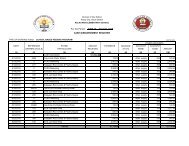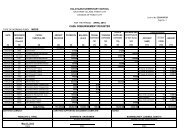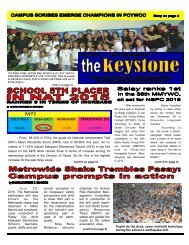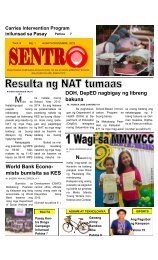SIP 2016-2018 final
Create successful ePaper yourself
Turn your PDF publications into a flip-book with our unique Google optimized e-Paper software.
This academic institution employs the 2002 Basic Education Curriculum (BEC) for Grades<br />
Five to Six learners and the Enhanced Basic Education Act of 2013 known as the K to 12 Curriculum<br />
for Kindergarten to Grade Four pupils in compliance to DepEd Order No. 43, s. 2002 and the<br />
Republic Act No. 10533 respectively. With these educational programs, this institution focuses on the<br />
tool learning areas for an adequate development of competencies for learning how-to-learn.<br />
In the K to 12 Program, the Universal Kindergarten is included. Study shows that<br />
children who involved in and completed a standard kindergarten program have better<br />
completion rates and are better prepared for primary education than those who did not. In the phase of<br />
learning, students learn in alphabet, numbers, shapes and colors through games, songs and dances, in<br />
their Mother Tongue.<br />
English as a subject is taught for 30 minutes in Grade One during Second Semester, for 50<br />
minutes in Grades Two to Four and for 60 minutes for Grades Five to Six. This learning area is<br />
concerned with developing competencies in listening, speaking, reading, writing and viewing among<br />
learners under the K to 12 program, while listening, speaking, reading and writing among learners<br />
under the BEC program. Science and Health concepts are used as content in this area (Content Integration)<br />
but not to the extent of neglecting the content in the English books for the grade.<br />
Mathematics is focused on providing learners with opportunities in the acquisition of skills<br />
and competencies necessary to gain understanding and appreciation of the subject. Each grade level<br />
has specific content of competencies to be developed among learners. This learning area is taught for<br />
50 minutes in Grades One and Two, and 60 minutes in Grades Three to Six.<br />
Science is introduced as a separate learning area in Grade Three. This area aims to<br />
develop scientific literacy among students that will prepare them to be informed and participative citizens<br />
who are able to make judgments and decisions regarding applications of scientific knowledge<br />
that may have social, health or environmental impacts. The K to 12 Science curriculum is learnercentered<br />
and inquiry-based, emphasizing the use of evidence in constructing explanations. The daily<br />
time allotment for this area is 50 minutes for Grade Three and Four and 60 minutes for Grades Five to<br />
Six.<br />
Filipino as a learning area, like English, provides for development of competencies in listening,<br />
speaking, reading, writing and viewing for Grades One to Four and listening, speaking, reading<br />
and writing for Grades Four to Five. Sibika at Kultura concepts and materials are used as content for<br />
this area. This is taught for 30 minutes in Grade One, for 50 minutes in Grades Two and Three, and<br />
for 60 minutes in Grades Five to Six.<br />
Mother Tongue is a new separate learning field in Grades One to Three. This is being used in<br />
the classroom as a bridge in learning Filipino and English. The daily time allotment for this subject is<br />
50 minutes for Grades One to Grades Two and Three.<br />
Makabayan is the laboratory of life, an experiential learning area consisting of Araling Panlipunan/Heograpiya,<br />
Kasaysayan at Sibika (AP/HEKASI) Edukasyong Pantahanan at<br />
Pangkabuhayan (EPP), Music, Arts, Physical Education and Health/Musika, Sining at Edukasyon sa<br />
Papalakas ng Katawan(MAPEH/MSEP) ; Edukasyon sa Pagpapakatao (EsP). It is taught for 150<br />
minutes in Grades One to Four, 120 minutes for Grades V and 140 minutes for Grades Five and Six.<br />
In as much as this institution deems that there is a need to enrich the curriculum in order to<br />
make it more relevant and responsive to the present generation of learners, and at the same time respond<br />
to fast changing demands of the present global community, the following department and<br />
school-based curricular programs are being implemented:















